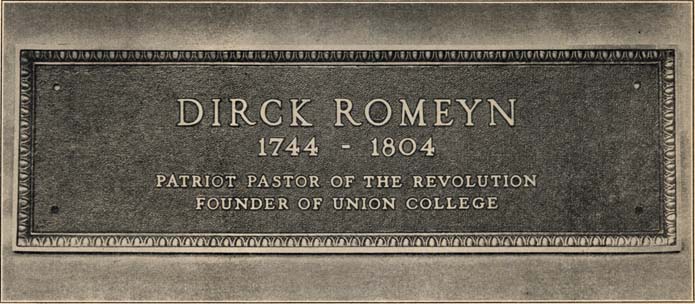
Plaque: "Dirck Romeyn, 1744-1804, Patriot Pastor of the Revolution, Founder of Union College"
Dirck Romeyn, instrumental in the founding of Union College, was born in New Barbados, New Jersey, now Hackensack, January 12, 1744. Little is known of his childhood except that part of his early instruction was received under the direction of his brother, a minister, and that even at the age of nine years young Dirck's mind turned strongly towards religion.
In 1765 he was graduated from the College of New Jersey, now known as Princeton University, and the following year was admitted to the Dutch Reformed ministry. His first pastorate was in Ulster County, New York, and from there, in 1776, he went to the Reformed Church in Hackensack where he had many thrilling experiences during the War of the Revolution. He was forced to flee with his wife and daughter to Marbletown from which he frequently returned to New Jersey to visit his congregation. In 1780, after he had returned to Hackensack with his family, he escaped capture, by hiding behind a chimney in the attic of his burning home, when the British and Hessian troops raided the city. He was referred to by the British as "the Rebel Parson" and it was reported that a price was set on his head because of his association with the highest officers of the American army.
Dr. Romeyn came to Schenectady in 1784 to be pastor of the Dutch Reformed Church. The next year he organized an academy which was regarded as a means to a higher end, the people of Schenectady having had in mind for some time to found a college. Ten years later, in 1795, the Regents of the University of the State of New York, of which Dr. Romeyn was a member, granted the charter for Union College. He died April 16, 1804 at the age of sixty years and with his wife is buried in Vale Cemetery.
In appearance Dr. Romeyn was tall and portly with a dignified manner. He was intensely interested in people, and his scholarship and energy were largely responsible for the founding of Union College. No portrait of him has yet been discovered.